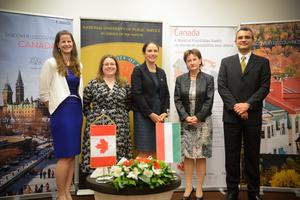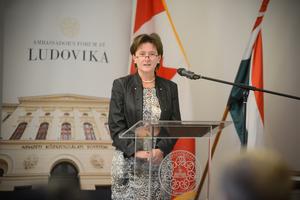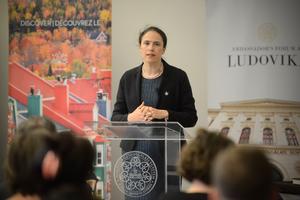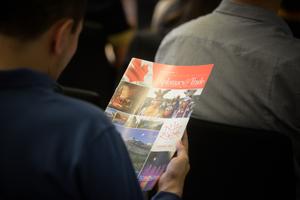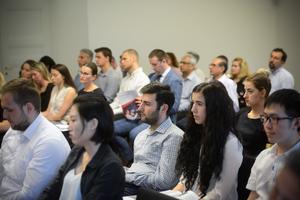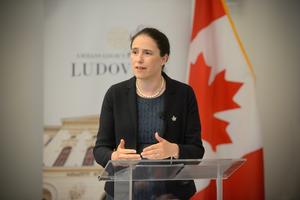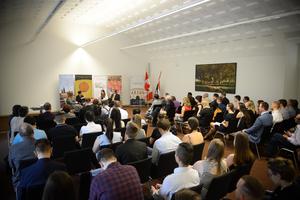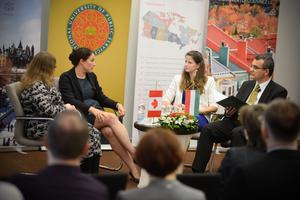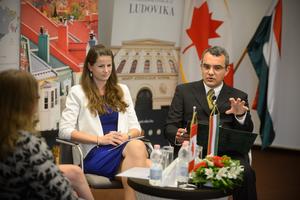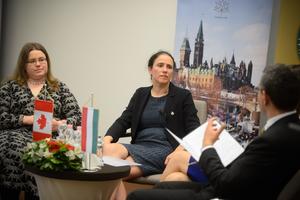H.E. Isabelle Poupart, Ambassador Extraordinary and Plenipotentiary of Canada to Hungary was the guest of this semester’s last Ambassador Forum at Ludovika on 8 May. The title of her presentation was „Advancing Foreign Policy Priorities through Empowerment, Inclusion and Progressive Trade – The Canadian Approach”.
H.E. Isabelle Poupart fulfills her role as Ambassador to Hungary since 2016. She joined the Quebec Bar in 1993 and worked as a lawyer prior to joining the Department of Foreign Affairs and International Trade in 1995. At Headquarters, she worked in the Legal Bureau and in the International Economic Relations and Summits and the Defence and Security Relations divisions. Her first assignment abroad was at the Permanent Mission of Canada to the United Nations in New York. She also worked for the Conflict Prevention Centre of the Organization for Security and Co-operation in Europe (OSCE) in Vienna. She served twice at the Joint Delegation of Canada to NATO in Brussels—the second time as head of the Political Section. Upon her return to Ottawa, she worked as senior adviser to the assistant deputy minister for Global Issues, Strategic Policy and Europe. Most recently, she was ambassador and permanent representative of Canada to the OSCE.
The event, organized by the International Relations Office, was opened by Dr. habil. Györgyi Nyikos. The NUPS’ Vice-Rector for International Affairs highlighted the importance of the event saying that the Ambassador Forum at Ludovika is a platform for discussing challenges in the world.
At the beginning of her speech, Her Excellency mentioned that youth engagement in Canada is very much emphasized topic today. Prime Minister Justin Trudeau created his Youth Council in 2016, whose members advise the prime minister on education, economy, climate change and other issues affecting youth. She also mentioned that Canada and the European Union share common values; for instance, they are working together within NATO, and they had to solve the migration crisis. Canada has a strong commitment to help the immigrants, and they are against Russian aggression in Ukraine.
In the first part of her speech, Ms. Poupart talked about gender empowerment in Canada. The country has the first gender equal cabinet in history: there are more and more women, and one of them, who sets an example is Julie Payette, engineer, astronaut and at the moment, the Governor General of Canada. According to Her Excellency, “the sky is not the limit”, and Ms. Payette can be a role model for lots of your women in the scientific field. The second topic of her speech was diversity. She presented a television commercial of a Canadian car company, where the country and its diverse people are in the middle, showing that multiculturalism is the basis of the Canadian society. Multiculturalism in this sense means the society values all newcomers, while they remain true to their origin countries but become Canadians. “Diversity is a fact, but inclusion is a choice”, she said, and Canada made this choice. They try to integrate people through their education system and in everyday life, and it seems to be working. The success of the managed migration program is another example of Canadian inclusion. The country relies on migration in a sense; it’s a big part of the population, in 2017, 21,9% of the country’s population was made up by immigrants. The support of managed migration by Canadian residents is very high, because they have confidence in the system. A big number of Canadian citizens volunteered to host refugees in the own homes for one year, which clearly states their dedication and willingness to help refugees.
Her Excellency highlighted the importance of CETA (Comprehensive Economic and Trade Agreement), launched in October 2017, a free-trade agreement between Canada and the EU and its member states. It aims to improve the terms of business with additional provisions for business owners.
The presentation of Her Excellency was followed by a roundtable discussion. The discussion was moderated by Dr. habil. Zoltán Jobbágy, Vice-Dean for Science and International Affairs at the Faculty of Military Sciences and Officer Training. The experts of the session were Ms. Diána Szőke, senior analyst of the Institute of Foreign Affairs and Trade, whose fields of research are the geopolitics of energy, climate change and sustainable development,
and Dr. Anna Péczeli, research fellow at the Center for Strategic and Defense Studies, National University of Public Service. One of the questions asked was regarding Canada’s rich natural sources and their use; about which Her Excellency said there is a very healthy debate in Canadian society between environmental protection and the use of clean energy. The discussion touched upon gender equality, Ms. Poupart mentioned that in the defense and security sector things move very slowly, and the percentage of women in the field is still quite low. However, there are more and more Canadian women ambassadors each year, which gives hope for women working in the political scene. She also said that their approach in the matter is that gender is never the obstacle in someone’s life to achieve what they want.
With Canada, the Ambassador Forum at Ludovika series for this academic year has come to an end. We will see you next time in September, and we hope you enjoyed the events!
